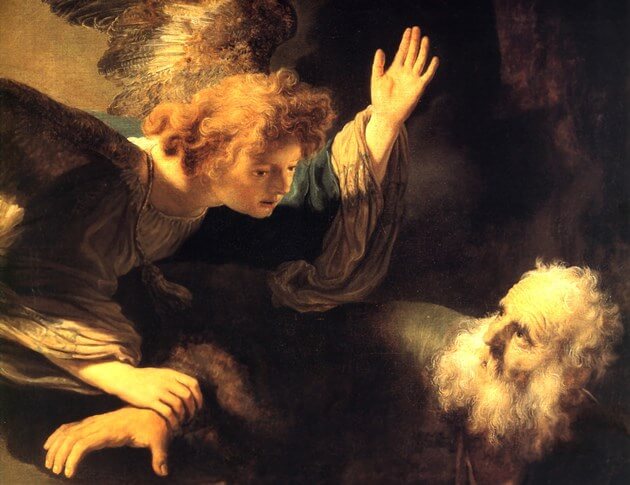
A Paradoxical Blessing
After Abraham passed the test of the Akeidah, the Binding of Isaac, an angel informed him:
“This is what God says: I have sworn by My Essence, since you performed this act and did not withhold your only son, I will bless you greatly and increase your descendants like the stars of the sky and the sand on the seashore. Your descendants will possess their enemies’ gate. And all the nations of the world will be blessed through your descendants.” (Gen. 22:16-18)
This blessing appears to contradict itself. On the one hand, Abraham is promised that his descendants will be victorious over their enemies: “Your offspring will possess their enemies’ gate.” On the other hand, his descendants will be prized and cherished by other peoples: “All the nations of the world will be blessed through your descendants.”
What will be the lot of Abraham’s descendants: hostility and strife from the nations, or love and respect?
Also: why did God compare the Jewish people to both the stars and the sand?
Two Realms: Internal and External
In fact, an angel appeared to Abraham not once but twice. The first time, an angel appeared just as Abraham was about to offer up his son, commanding him:
“Do not lay your hand on the boy. Do not do anything to him. For now I know that you fear God.” (Gen. 22:12)
Why were there two messages from God?
We all live in two realms. There is our external world of action and deed; and there is our hidden inner life, our thoughts and desires. Often there lies a wide discrepancy between our outward actions and our inner thoughts and intentions.
The Akeidah occurred differently in these two realms. In the realm of actual deed, Abraham offered a ram on Mount Moriah. But in his inner thoughts and emotions, in his extraordinary dedication and love for God, Abraham offered up his own son. The Midrash writes:
“As he performed each stage of offering [the ram], Abraham prayed: ‘May it be Your will that this act should be considered as if it was done to my son: as if my son was slaughtered, as if his blood was sprinkled, as if my son was flayed, as if he was burnt and reduced to ashes.'” (Rashi, based on Tanchuma Shelach 14)
The two calls from heaven, as well as the dual blessing, correspond to the two aspects of the Akeidah: in deed and in thought; the actual and the potential; the revealed and the hidden.
The first call from heaven stopped Abraham from physically carrying out the Akeidah. “Do not lay your hand on the boy.” This summons related to Abraham’s inner state of holiness, fully revealed only to God. “For now I know that you fear God.” Only God truly knew the nobility of Abraham’s soul. This level of hidden holiness could not be expressed in action. “Do not do anything.”
After Abraham offered the ram in place of his son, a second angel appeared. Abraham’s inner devotion had been expressed also in the realm of action. Now, the angel informed Abraham, his blessing was no longer limited to himself, to his own inner spiritual world, but extended to all future generations of his descendants. Abraham had succeeded in revealing his inner holiness in the physical realm. The angel emphasized that Abraham had realized his love for God in deed and action, “since you performed this act.”
What is the meaning of this unusual oath, בִּי נִשְׁבַּעְתִּי ,“I have sworn by My Essence”? This short phrase refers to both the inner and revealed dimensions. God’s Essence is, of course, the deepest, most profound secret. An oath, on the other hand, is a promise to take action, to act upon an inner decision.1
Dual Blessing
This dichotomy of the hidden and the revealed explains Abraham’s dual blessing. Why were his children likened to both the stars and the sand? They will reach for the stars as they strive to realize their inner aspirations. At the same time, they will be like the sand, with a down-to-earth holiness, expressed with practical mitzvot.
The story of Abraham’s descendants among the nations also reflects this dual nature. In the beginning, the Jewish people made their appearance as yet another nation in the world, struggling against enemies and foes. Their inner sanctity was hidden and unrecognized. At this stage in their history, the Jewish people require the Divine blessing of “possessing their enemies’ gate.”
But in the future, God’s hidden light on the Jewish people will be revealed to all. The nations will recognize that this is no ordinary nation; Israel is the revelation of God’s will in humanity and the entire universe. They will acknowledge Israel’s inner sanctity: “All the nations of the world will be blessed through your descendants.”
(Adapted from Olat Re’iyah vol. I, pp. 94-96)
1 The word “oath” (shevu'ah) has the same Hebrew root as the word “seven,” thus corresponding to the seven days of creation and the physical world.
Illustration image: The Sacrifice of Isaac. (Rembrandt, 1635)





